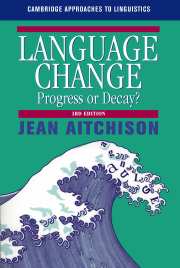Book contents
15 - Language birth
How languages begin
from Part 4 - Beginnings and endings
Summary
Language was born in the courting days of mankind – the first utterances of speech I fancy to myself like something between the nightly love-lyrics of puss upon the tiles and the melodious love-songs of the nightingale.
Otto Jespersen, Language, its nature, development and origin (1922)Most people are quite puzzled about how languages might come into being. When they think about language birth, their thoughts are led inevitably to the fascinating problem of the ultimate origin of language. Various bizarre hypotheses have been put forward over the past hundred years or so. The ‘ding-dong’ theory claimed that the earliest words were imitations of natural sounds such as bang!, cuckoo, splash!, moo. The ‘pooh-pooh’ theory suggested that language arose from cries and gasps of emotion. The ‘yo-he-ho’ theory proposed that language was ultimately based on communal effort, with essential instructions such as Heave! and Haul! being the first words spoken, and numerous other speculative ideas were put forward. For example, the Danish linguist Otto Jespersen argued that ‘We must imagine primitive language as consisting (chiefly at least) of very long words, full of difficult sounds, and sung rather than spoken … His musings on ‘the courting days of mankind’ are given in the quote at the top of the chapter.
Eccentric speculations led to widespread disapproval. In 1866, a ban on papers about language origin was issued by the Linguistic Society of Paris, the foremost linguistic society of the time.
- Type
- Chapter
- Information
- Language ChangeProgress or Decay?, pp. 217 - 234Publisher: Cambridge University PressPrint publication year: 2000

